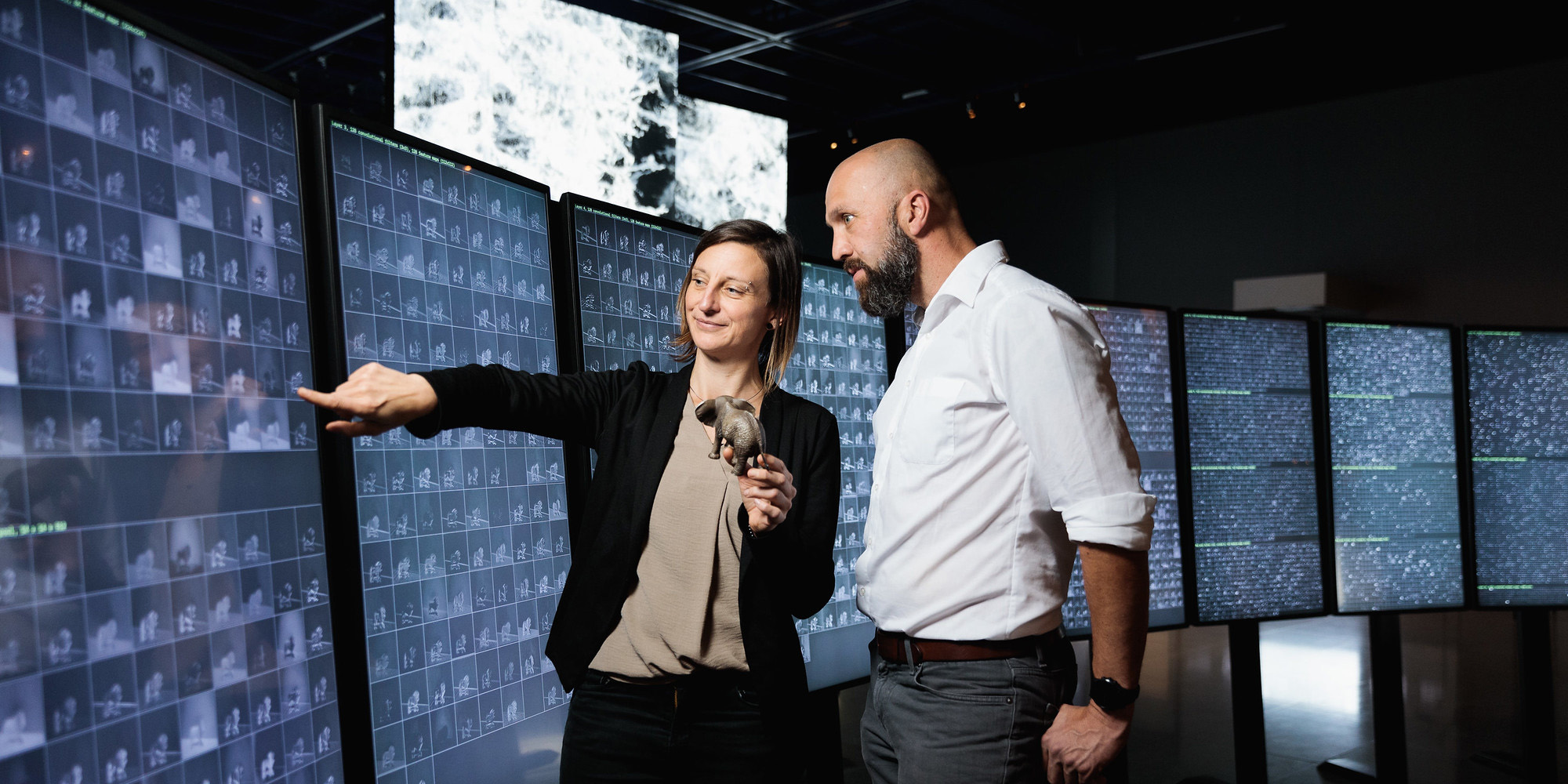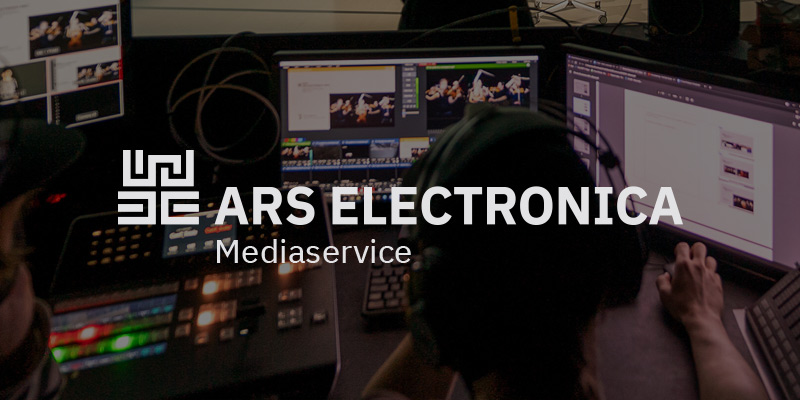TUE 14.1.2020 – SUN 2.2.2020
Press release as PDF
Ars Electronica Blog
Photo collection Ars Electronica Center on Flickr
(Linz, 12.1.2020) Train self-propelled cars, produce music using AI algorithms, experience a computer grand piano that can record and precisely reproduce pieces played by human pianists or learn more about a neural network that composes music a la Beatles. From January 14 to February 2, 2020, the Ars Electronica Center will be devoting expert talks, workshops and Deep Space presentations to the topic of “Artificial Intelligence – the revolution behind the hype”. Special guided tours of the “Understanding Artificial Intelligence” exhibition will show how artificial intelligence works, what such systems can and cannot do.
The program of the theme weeks at a glance:
Deep Space Special: Artificial Intelligence / TUE 14.1.-SO 2.2.2020, 4 p.m. – 4:30 p.m.
From Tuesday to Sunday, a Deep Space Special on the topic of artificial intelligence will offer visitors a visually stunning panopticon of various fields of AI application – from medicine to media art.
Guided tour: AI & YOU / TUE 14.1.-SUN 2.2.2020, 3 p.m. – 4 p.m. / THU 23.1. and THU 30.1.2020, 6 p.m. – 9 p.m.
Artificial intelligence is a much used term. But what is actually hidden behind it and how does AI affect our lives? On this tour, visitors will gain insight into the basic functioning of AI and also learn where it has already found its way into everyday life.
Guided tour: About instruments that play by themselves / THU 16.1.2020, 4:30 p.m. – 6:00 p.m. / FRI 17.1. and SAT 18.1.2020, 2:00 p.m. – 3:30 p.m. / SUN 19.1.2020, 12:00 noon – 1:30 p.m.
During this guided tour through the exhibition “AI x Music”, visitors will learn more about the interplay of artificial intelligence and music and, with the Bösendorfer 290 Imperial CEUS computer piano, they will get to know an instrument that can play all by itself. Afterwards, the history of the creative interaction between man and machine is examined in more detail. In the “Open Sound Studio” visitors can then develop their own music using AI algorithms.
Deep Space LIVE: Fata Morgana / THU 16.1.2020 / 7 p.m. – 8 p.m.
Fantastic visual worlds in harmony with music await visitors to Deep Space LIVE Thursday evening, January 16, 2020. 7:00 p.m. is the start of a concert by the musicians Sabine Reiter (violin), Barbara Körber (cello) and Suyang Kim (piano) under the motto Fata Morgana. The accompanying visualizations are by Marlene Reischl, Christian Philip Berger and Joachim Smetschka from the University of Art and Design Linz. The Deep Space, with its 16 by 9 meter wall and floor projections, provides an immersive setting for this interplay of music and visualization, in which traditional concert conventions are dissolved.
Open Piano for Refugees / THU 16.1. – SUN 19.1.2020
With the initiative Open Piano for Refugees, freely accessible grand pianos “artfully” enliven public space and bring together people from different countries and social classes. This creates places of encounter where language and words become superfluous. Anyone who would like to know what distinguishes human piano playing in comparison to mechanical piano playing can get to know a Bösendorfer computer piano in the exhibition “AI x Music”, which can record and precisely reproduce the one just played.
Open Workshop: Ding Dong / SAT 18.1.2020, 10:00 a.m – 1:30 p.m. (for children 8 years and older)
If you have fun experimenting with sounds and tones, then “Ding Dong” is the right choice for you. Here all possible and impossible objects are made to sound and are used in the Open Soundstudio as a basis for new songs.
Lecture: When computers create emotions in us / SAT 18.1.2020, 3 p.m. – 4 p.m. / in the exhibition AI x Music, Piano Room, Level 2
In recent years, scientists have repeatedly attempted to use artificial intelligence to solve creative tasks, such as the creation of texts, images or music. So can machines be creative, or is that reserved for humans? Ali Nikrang, artist and scientist at the Ars Electronica Futurelab discusses this question using the example of the “Mahler Unfinished” project.
Open Sound Studio: MuseNet Special / SAT 18.1.2020, 4 p.m. – 5:30 p.m. / SUN 19.1. 2020, 2 pm. – 5.30 p.m.
MuseNet is a deep neural network that can create four-minute music compositions with ten different instruments. Different music styles can be generated – from Country to Mozart and the Beatles. The participants can be curious to see what the AI will compose based on their own specifications.
Open Workshop: Donkey Training / WED 22.1. & SO 2.2.2020, 2 p.m. – 5 p.m.
With the help of artificial intelligence a robot car is taught to drive independently. Subsequently, it is checked whether the vehicle actually follows the trained instructions.
Deep Space LIVE: Panoptikum – Artificial Intelligence / THU 23.1.2020, 7 p.m. to 8 p.m.
For more than 20 years, Panoptikum was a regular feature on Austrian television. In the new edition of Panoptikum, Gerfried Stocker, Ars Electronica’s Artistic Director and Museum Director Christoph Kremer will present current developments and research findings in the field of artificial intelligence in Deep Space 8K.
Guided tour: Making of “Understanding Artificial Intelligence” / FR 24.1.2020, 4 p.m. – 5 p.m.
On a guided tour of the “Understanding Artificial Intelligence” exhibition, staff members of the Ars Electronica Futurelab will provide an exclusive insight into the development and realization of this unique AI exhibition.
PhiloLab: Artificial Intelligence / SAT 25.1.2020, 10 a.m.-2 p.m. (13 years and older) (registration required at the ticket office)
The focus of PhiloLab is to jointly reflect on the phenomenon of “artificial intelligence” and its effects.
Guided tour: Power to the People / SAT 25.1., FRI 31.1.2020, 2 p.m. – 3 p.m.
This tour is not only dedicated to technological, civil and political developments that carry the potential of a democratic-political threat, keyword “transparent man”, but also to the already existing approaches with which some risks can be counteracted.
Open Workshop: Hands-on Artificial Intelligence / SAT 25.1. and SAT 1.2.2020, 4:30 p.m.-5:30 p.m. / TUE 28.1. and FRI 31.1.2020, 4 p.m. – 5 p.m.
Can machines actually be creative? And how is it determined by which rules self-propelled cars make decisions? In this workshop participants will learn interesting facts about artificial intelligence and related ethical aspects. In addition, visitors will learn what artificial intelligence is already capable of today and what questions arise for different areas of application.
Workshop: AUTOnom / SUN 26.1.2020, 10 a.m. – 1 p.m. (11 years and older) (registration at the ticket office required)
Self-propelled cars can manoeuvre from A to B without human control, but are repeatedly confronted with complex situations. Artificial intelligence is used to master these situations and learn from them. But how does this machine learning actually work? Participants gain insights into the control mechanisms of robotic devices and learn in the Machine Learning Studio how computers can see and machines can learn.
Deep Space LIVE: Why Siri does not understand my grandma – and other impertinences of artificial intelligence / THU 30.1.2020, 7 p.m. – 8 p.m.
A common assumption is that computer algorithms – unlike users – treat all people neutrally or provide them with the same information, good or bad. Robot psychologist Martina Mara shows the opposite with surprising practical examples and tells us that some AI systems discriminate against groups of people on the basis of their gender, age or mobile phone brand and what can be done about it.
Workshop: Machine 9 x smart / SAT 1.2.2020, 10 a.m. – 1 p.m. (for children from 6 – 10 years) (registration at the cash desk required)
Can machines actually “think” or “learn”? Of course they can. That’s called artificial intelligence. In this workshop, the young participants will get to know various examples and see how well or badly machines perform compared to human intelligence.
Guided tour: From glass to the black box / SUN 2.2.2020, 11 a.m. – 12 noon
This tour is all about the human brain. Visitors learn how the brain is altered by training and what the brain can do in combination with machines.
Photo:
Ali Nikrang and the Bösendorfer 290 Imperial CEUS / Fotocredit: vog.photo / Printversion
Photo:
The Instrument that plays by itself / Fotocredit: vog.photo / Printversion
Photo:
Neural Network Training / Fotocredit: vog.photo / Printversion
Photo:
Deep Space LIVE: Fata Morgana / Fotocredit: Philipp Greindl / Printversion


